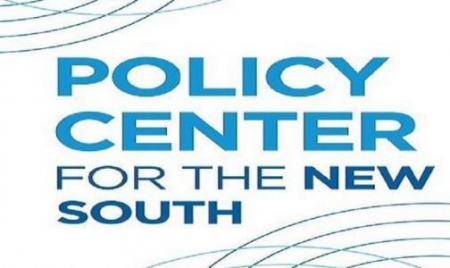Policy Center for the New South Releases 10th Edition of Atlantic Currents
The Policy Center for the New South (PCNS) has released the 10th edition of its annual report Atlantic Currents, which addresses threats, challenges, and opportunities in the Atlantic space. This report, published ahead of each edition of the international conference The Atlantic Dialogues, provides yearly analyses from experts across the extended Atlantic region, according to a PCNS statement. The same source further notes that this edition benefited from contributions by authors representing more than 24 states from different regions of the Atlantic (Insular Caribbean, Central America, North America, Northern Europe, Southern Europe, North Africa, West Africa, and three non-Atlantic countries: Italy, Japan, Peru). As a flagship publication of this Moroccan think tank, Atlantic Currents succinctly covers the threats and challenges facing Atlantic basin states, as well as opportunities and various political and diplomatic initiatives that have emerged on both sides of the Atlantic, the same source specifies. Coordinated by Mohammed Loulichki, former Ambassador of Morocco to the United Nations and Senior Fellow of the Policy Center, the book offers a mosaic of multidisciplinary and intergenerational perspectives on the central theme of the Atlantic Dialogues conference: “A more assertive Atlantic: Its meaning for the world.” Contributing authors explore various aspects of the Atlantic connection, identifying challenges to overcome, tools to mobilize, and cooperation prospects in the fields of trade, environmental protection, energy security, demographic dividend, and the promotion of “Pax Atlantica.” Under the title “Shared destiny across the Atlantic: pathways to a strengthened partnership between Africa and Latin America,” Laura Albornoz Pollmann highlights the shared destiny of these continents, calling for unity to address common challenges such as democratic weaknesses, institutional fragility, and socio-economic inequalities. Quoted in the statement, Pollmann emphasizes the need for collaborative strategies, particularly focusing on resolving the energy and climate crisis. Exploring “Pathways for Atlantic cooperation,” Saloi El Yamani examines the potential of the aerospace industry to stimulate transatlantic cooperation, while Afaf Zarkik and Sabrine Emrane delve into energy purchase agreements as a lever to promote the adoption of renewable energies on the Atlantic façade. On the other hand, Ahmed Ouhnini reviews collaboration opportunities between Latin America and the African continent on globally consumed tropical agricultural commodities such as coffee and cocoa, with the aim of making their value chains more advantageous for the southern countries of the Atlantic basin. This publication aims to enrich and deepen the reflection initiated a decade ago on a shared Atlantic, addressing the asymmetry characterizing North-South relations and working towards densifying relations between the two southern regions. “While recognizing the inherent limitations in building an extended transatlantic community that is more connected and supportive, our ambition remains to continue deepening and enriching the reflection on a shared Atlantic and supporting initiatives launched to achieve this goal,” emphasizes the PCNS.

